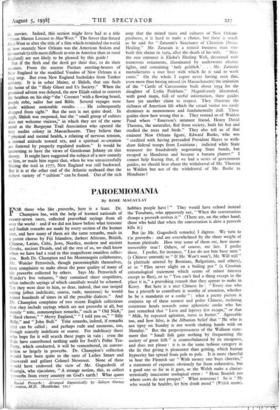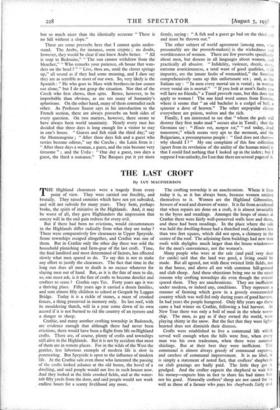PAROEMIOMANIA
By ROSE MACAULAY
OR those who like ..proverbs, here is a feast. Dr. r Champion has, with the help of learned nationals of twenty-seven races, collected proverbial sayings from all over the world : and if we did not know before what tiresome and foolish remarks are made by every section of the human race, and how 'many of them are the same remarks, made in a parrot chorus by Fiji Islanders, darkest Africans, British, Chinese,- Latins, Celts, Jews, Nordics, modern and ancient Greeks, ancient Druids, and all the rest of us, we shall know when we have had a read in this magnificent omnibus collec- tion. Both Dr. Champion and his Montenegrin collaborator, Mr. Woislav Petrovitch, though paroemiophils themselves, have complaints to make about the poor quality of many of the proverbs collected by others. Says Mr. Petrovitch of Wander's five volumes, " they contained sheer stupidities, often imbecile sayings of which cannibals would be ashamed. Yet they were dear to him, so dear, indeed, that one insipid saying (often indelicate, coarse, rude, nauseous) he would repeat hundreds of times in all the possible dialects." And Dr. Champion complains of two recent English collections that they include sayings which are not proverbs at all, but merely " trite, commonplace remarks," such as " Old Nick," Hard cheese," " Merry England," " I told you so," " Silly Billy," and " John Bull." Trite remarks, indeed, if remarks they can be called ; and perhaps rude and nauseous, too, though scarcely indelicate or coarse. For indelicacy those who hope for it will search these pages in vain ; even the Fijis have contributed nothing unfit for Swift's Polite Tea- Party, which conducted, it will be remembered, its conver- sation so largely in proverbs. Dr. Champion's collection would have been quite to the taste of Ladies Smart and Answerall and gallant Colonel Neverout. None of these would have endorsed the view of Mr. Gugushvili of Georgia, who ejaculates, " A strange notion, this, to collect proverbs froin every country on God's earth ! What queer Racial Proverbs : Arranged linguistically by . Selwyn Gurney C Tampion, M.D. (Routledge. 35s.) hobbies people have ! " They would have echoed instead the Torubans, who apparently say, " When the conversation droops a proverb revives it." (There are, on the other hand, those who hold that when the conversation is alive a proverb kills it.) But (as Mr. Gugushvili remarks) I digress. We turn to tie proverbs : and are overwhelmed by the sheer weight of human platitude. How true some of them are, how incon- trovertibly true ! Others, of course, are lies. I prefer these. I prefer, for instance, " Lice do not bite busy men " (a Chinese untruth) to " If Mr. Won't won't, Mr. Will will " (a platitude uttered by Bosnians, Bulgarians, and others), or to " Flies never alight on a boiling pot " (a Croatian entomological statement which seems of minor interest except to flies), or to " You can't find a thing except in the place it is," a provoking remark that they appear to make in Kerry. But here is a nice Chinese lie : " Every one who has a proverb to contribute is worthy of attention, whether he be a mandarin or a coolie " : what a pretty picture it conjures up of these earnest and polite Chinese, inclining courteous heads towards some aphoristic coolie who has just remarked that " Love and leprosy few escape," or that " Milk, by repeated agitation, turns to butter." Agreeable too, and how false, is the Albanian belief that " He who is not tipsy on Sunday is not worth shaking hands with on Monday." But the preposterousness of the Walloon state- ment that " Small folk gain nothing by frequenting the society of great folk " is counterbalanced by its smugness, and does not please : it is in the same tedious category as the lie that giving is pleasanter than getting, which human hypocrisy has spread from pole to pole. It is more cheerful to hear the Flemish say " With money one buys cherries," a statement of expenses obviously far from exhaustive, but a good one so far as it goes, or the Welsh make a charac- teristically inaccurate zoological error : " Hens flourish not where cows do not prosper." What nonsense ! So is " He who would be healthy, let him drink mead " (Welsh again), but so much nicer than the idiotically accurate " There is no hill without a slope."
There are some proverbs here that I cannot quite under- stand. The Arabs, for instance, seem cryptic ; no doubt, however, they would be clear if one knew Arabs better. " All is soap to Bedouins," " The sun cannot withdraw from the bleacher," " Who remarks your patience, oh house that wan- ders on the head ? " " Live, thou ass, until the clover springs up," all sound as if they had some meaning, and I dare say they are as sensible as most of our own. So, very likely is the Spanish : " He who goes to Mass with brothers-in-law comes out alone," but I do not grasp the situation. Nor that of the Czech who first chews, then spits. Better, however, to be improbable than obvious, as are too many of humanity's aphorisms. On the other hand, many of them contradict each other. As Professor Saurat says in his introduction to the French section, there are always proverbs on both sides of every question. On two matters, however, there seems to have always been world unanimity. Nearly every race has decided that three days is long enough for a visitor to stay in one's house. " Guests and fish stink the third day," say the Montenegrins ; " After three days fish and a guest who tarries become odious," say the Czechs ; the Latin form is : " After three days a woman, a guest, and the rain become very tiresome " ; and the Urdu : " One day a guest, two days a guest, the third a nuisance." The Basques put it yet more firmly, saying : "•A fish and a guest go bad on the third Lay and must be thrown out."
The other subject of world agreement (among men, who presumably are the proverb-makers) is the wickedness and worthlessness of women. There are few proverbs specifically about men, but dozens in all languages about women, and practically all abusive. " Infidelity, violence, deceit, envy, extreme avariciousness, a total want of good qualities, with impurity, are the innate faults of womankind," the Sinskrit comprehensively sums up this unfortunate sex ; and, as the Italians say : " In men every mortal sin is venial.; in women every venial sin is mortal." " If you look at men's faults you will have no friends," a Tamil proverb runs, but this does not apply to women ! The one kind word comes from Estonia, where it seems that " an old bachelor is a cudgel of hell, a spinster a dove of heaven." The other unpoptilar classes everywhere are priests; wolves and the rich. • Finally, I am interested to see that " whom the gods will destroy they first make mad " occurs also in Tamil ; that the Germans say : " Heute rot, morgen tot," " red today, dead tomorrow," which seems very apt to the moment, and the Bulgarians, a presumptuous people : " God does not shave— why should I ? " My one complaint of this fine collection (apart from its revelation of the anility of the human mind) is that I could find nothing that I looked up in the index; but I suppose I was unlucky, for I see that there are several pages of it.



































 Previous page
Previous page